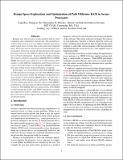Design space exploration and optimization of path oblivious RAM in secure processors
Author(s)
Ren, Ling; Yu, Xiangyao; Devadas, Srinivas; Fletcher, Christopher Wardlaw; Van Dijk, Marten
DownloadDevadas_Design space.pdf (2.677Mb)
OPEN_ACCESS_POLICY
Open Access Policy
Creative Commons Attribution-Noncommercial-Share Alike
Terms of use
Metadata
Show full item recordAbstract
Keeping user data private is a huge problem both in cloud computing and computation outsourcing. One paradigm to achieve data privacy is to use tamper-resistant processors, inside which users' private data is decrypted and computed upon. These processors need to interact with untrusted external memory. Even if we encrypt all data that leaves the trusted processor, however, the address sequence that goes off-chip may still leak information. To prevent this address leakage, the security community has proposed ORAM (Oblivious RAM). ORAM has mainly been explored in server/file settings which assume a vastly different computation model than secure processors. Not surprisingly, naïvely applying ORAM to a secure processor setting incurs large performance overheads.
In this paper, a recent proposal called Path ORAM is studied. We demonstrate techniques to make Path ORAM practical in a secure processor setting. We introduce background eviction schemes to prevent Path ORAM failure and allow for a performance-driven design space exploration. We propose a concept called super blocks to further improve Path ORAM's performance, and also show an efficient integrity verification scheme for Path ORAM. With our optimizations, Path ORAM overhead drops by 41.8%, and SPEC benchmark execution time improves by 52.4% in relation to a baseline configuration. Our work can be used to improve the security level of previous secure processors.
Date issued
2013-06Department
Massachusetts Institute of Technology. Computer Science and Artificial Intelligence Laboratory; Massachusetts Institute of Technology. Department of Electrical Engineering and Computer ScienceJournal
Proceedings of the 40th Annual International Symposium on Computer Architecture (ISCA '13)
Publisher
Association for Computing Machinery (ACM)
Citation
Ling Ren, Xiangyao Yu, Christopher W. Fletcher, Marten van Dijk, and Srinivas Devadas. 2013. Design space exploration and optimization of path oblivious RAM in secure processors. SIGARCH Comput. Archit. News 41, 3 (June 2013), 571-582.
Version: Author's final manuscript
ISBN
9781450320795